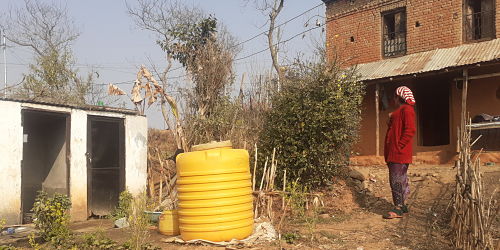
Understanding both these issues is critical for governments and policy makers to be able to make informed choices in trade-offs between reducing emissions and developing resilient and sustainable services that protect public health. The key aspects of this research include:
-
- providing improved estimates of greenhouse gas emissions associated with on-site sanitation in urban areas and small towns. This will help us to identify the technology and management options that will optimise the reduction in emissions with safe and reliable services that meet the needs of women and girls.
- improving understanding of how to enhance the resilience of sanitation services, with regards to climate change and greenhouse gas reduction, in resource-limited settings
- improving the availability of climate products and services, such as climate projections and data, in an accessible manner for operational and policy decision-making in sanitation services in low- and middle-income countries.
Research outputs by the SCARE team
- Reddy, O.; Rahman, M.; Nijhawan, A.; Pregnolato, M.;Howard, G. Infiltrated Pits: Using Regional Groundwater Data to Estimate Methane Emissions from Pit Latrines. Hydrology 2023, 10, 114. https://doi.org/10.3390/hydrology10050114.
- Poudel P, Ghimire A, Howard G, Evans B, Camargo-Valero MA, Reddy O, Sharma S, Tuladhar S, Geremew A, Okurut K, Ngom B, Baidya M & Dangol S. 2023. Field-based methods for measuring greenhouse gases emissions from on-site sanitation systems: A systematic review of published literature. Heliyon, 9 e19947, https://doi.org/10.1016/j.heliyon.2023.e19947
See more outputs including conference abstracts and presentations to date

Working with local stakeholders, government, and policy makers
Field research and policy engagement will take place in
- South Asia (Nepal)
- East Africa (Ethiopia and Uganda)
- West Africa (Senegal)
Given the political priority accorded to improving sanitation services in the countries and their increasing economic development, significant investments in improving safely managed sanitation can be expected in the short- to medium term. Choices made about technology and service delivery approach will have a profound impact on whether these investments minimise emissions from sanitation and whether sanitation services are resilient to increasing climate threats. Undertaking work in four countries will allow a better understanding of how emissions vary with context and to understand resilience in different climates.
Developing tools and methods
The SCARE project is developing a range of tools and methods for assessing emissions and resilience. As these are developed and tested, we will make these available on our website.
Download our SCARE postcard with key facts and contact about the project (pdf file)

